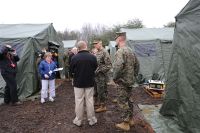WASHINGTON, Oct. 15, 2010 — The Marine Corps has deployed an experimental forward operating base to Afghanistan to assess how it stands up to rugged operational conditions while relying solely on renewable technology and energy-saving techniques.
The 3rd Battalion, 5th Marine Regiment’s Company I is moving into position in Helmand province, where it will sustain itself almost entirely using renewable energy, Marine Corps Col. Bob “Brutus” Charette said during a panel discussion this week.
Charette, the Marine Corps’ “energy czar,” cited this milestone as the Defense Department observed a week of energy security events.
The project began with an experiment to determine baseline requirements for company-size and smaller FOBs that typically have to provide their own fuel, electricity, water and food.
From there, the Marine Corps Warfighting Laboratory, Combat Development Command, acquisition community and others evaluated existing commercial, off-the-shelf technology able to meet those needs. The result is Ex-FOB, a tent complex that runs on solar-powered generators and other “green” energy to power its systems.
Marines field testing the system at Marine Corps Air Ground Combat Center at Twentynine Palms, Calif., operated 190 hours straight with almost no fossil fuel usage, Charette reported. Only their observation equipment required generator power. “We’re working on that right now,” he said.
In this next phase of the Ex-FOB development, deployed Marines will evaluate how it fares in a combat environment.
“We took the 80-percent solution,” Charette said. “We trained Marines up on it and we deployed them.”
The jury is still out on how it will perform, Charette said.
“But I like to say we are cautiously optimistic,” he said. “We will see how things go.”
A fighter pilot appointed as the first director of the Corps’ new Expeditionary Energy Office, Charette has taken on the improbable role of “Green Baron” without losing his “Red Baron” mindset.
Technology has made the Marine Corps increasingly lethal, he said, noting that a company of about 150 Marines on the battlefield today has about the same combat effectiveness of 1,000 Marines 10 years ago.
But those advancements in information and communication technology, intelligence assets and computer servers, Charette said, have come at a cost in weight, bulk and energy dependence.
“In the Marine Corps, we think of ‘expeditionary’ as lethal, austere and fast,” he said. “We’ve become extremely lethal, but today, we are a little less fast and a little less austere.”
In fact, if the Marine Corps took its 80,000 generators to sea, “we would sink a nuclear aircraft carrier,” Charette joked.
“We are in real danger of not fitting on Navy shipping right now,” he said, turning serious. “That’s a huge concern for us. So we need to get back to our naval roots, we need to get back to the sea and we need to go back with all the lethality of the systems we have today.”
Gen. James T. Conway, the Marine Corps commandant, has led the charge in promoting renewable energy sources to reduce the Corps’s reliance on fuel and electric generators.
Conway has set ambitious goals of cutting energy and water consumption not just at Marine bases but also in the expeditionary force. For deployed Marines, his goal is to reduce fuel usage by one-half by 2025. That means reducing current fuel usage — about eight gallons per day for every Marine in Helmand province — to four gallons, Charette said.
Increased reliance on solar and other renewable energy sources, as demonstrated by the Ex-FOB and other ground-renewable, expeditionary energy systems, or GREENS, are expected to go a long way in helping the Corps reach that goal, Charette said.
But he’s banking on about 25 percent of the energy savings coming from a cultural shift — what the Marine Corps calls its “ethos.”
“We want to equate combat effectiveness with resource effectiveness,” Charette said. “We don’t like to talk about demand reduction. We don’t want to talk about taking anything away.
“We want to talk about… mentally thinking about your resources — your liquid logistics,” he continued. “Your water, your fuel is as much a part of your combat effectiveness as combined arms are. It is part of your ethos.”
Less dependence on fuel and other logistical support saves money and energy. But Charette said it also means fewer vehicles on the road and fewer Marines putting their lives at risk maintaining the supply train.
He noted that four Marines with the 3rd Battalion, 5th Regiment — the ones testing the Ex-FOB — died earlier this week driving the roads in Afghanistan.
“This is a real issue. Youngsters out there are risking their lives every day,” Charette said. “So we are going to keep after this. We are not going to quit. And I don’t see it ever changing.”
Source:
U.S. Department of Defense
Office of the Assistant Secretary of Defense (Public Affairs)

 von
von 